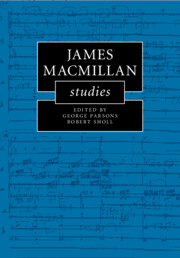Book contents
- James MacMillan Studies
- James MacMillan Studies
- Copyright page
- Contents
- Music Examples
- Tables
- Contributors
- Foreword
- Acknowledgements
- Introduction
- 1 The Struggle with Conviction: A Trio of String Quartets
- 2 Conflicting Modernities and a Modernity of Conflict in James MacMillan’s The World’s Ransoming
- 3 In Memoriam: James MacMillan’s Violin Concerto as Modernist Lament
- 4 Reincarnating The Tryst: The Endurance of a Simple Love Song
- 5 Exquisite Violence: Imagery, Embodiment and Transformation in MacMillan
- 6 Making the Familiar Unfamiliar: MacMillan’s St Luke Passion
- 7 MacMillan’s ‘Mission’ and the Passion Settings
- 8 A Cluster of Gathering Shadows: Exposition and Exegesis in Seven Last Words from the Cross
- 9 James MacMillan’s The Sun Danced: Mary, Miracle and Mysticism
- 10 ‘Shrouded in Doubts and Fears’: The Liturgical Music of James MacMillan
- 11 Containing Chaos? Aspects of Medieval Liturgy in James MacMillan’s Visitatio Sepulchri
- Bibliography
- Index
8 - A Cluster of Gathering Shadows: Exposition and Exegesis in Seven Last Words from the Cross
Published online by Cambridge University Press: 20 August 2020
- James MacMillan Studies
- James MacMillan Studies
- Copyright page
- Contents
- Music Examples
- Tables
- Contributors
- Foreword
- Acknowledgements
- Introduction
- 1 The Struggle with Conviction: A Trio of String Quartets
- 2 Conflicting Modernities and a Modernity of Conflict in James MacMillan’s The World’s Ransoming
- 3 In Memoriam: James MacMillan’s Violin Concerto as Modernist Lament
- 4 Reincarnating The Tryst: The Endurance of a Simple Love Song
- 5 Exquisite Violence: Imagery, Embodiment and Transformation in MacMillan
- 6 Making the Familiar Unfamiliar: MacMillan’s St Luke Passion
- 7 MacMillan’s ‘Mission’ and the Passion Settings
- 8 A Cluster of Gathering Shadows: Exposition and Exegesis in Seven Last Words from the Cross
- 9 James MacMillan’s The Sun Danced: Mary, Miracle and Mysticism
- 10 ‘Shrouded in Doubts and Fears’: The Liturgical Music of James MacMillan
- 11 Containing Chaos? Aspects of Medieval Liturgy in James MacMillan’s Visitatio Sepulchri
- Bibliography
- Index
Summary
Seven Last Words from the Cross is a landmark work in MacMillan’s career. Contextualized within MacMillan’s own oeuvre and the historical genre, this chapter analyses Seven Last Words both musically and theologically, demonstrating that rather than merely being a setting of the traditional text, MacMillan has provided a sophisticated exegesis of the seven last words uttered by Jesus. This is achieved through textual and musical means that demonstrate MacMillan’s modernist approach to tradition. Although the work is powerful and effective as an occasion-specific Christian work, MacMillan has managed to transcend time and place, and make the historicized narrative into a psychological melodrama. MacMillan’s exposition speaks to a traditional understanding of the seven last words representing respectively forgiveness, salvation, relationship, abandonment, distress, triumph and reunion. Through a series of connected musical episodes MacMillan has utilized an array of musical techniques that serve to underscore the dramatic narrative. By analysing key structural moments and deconstructing the sophisticated and multi-layered theology, this chapter demonstrates that MacMillan has, in the words of George Mackay Brown, found ‘an old wisdom out of the cluster of gathering shadows’. Ultimately, MacMillan leaves his listeners with a legend that is ultimately human and unfailingly optimistic.
Keywords
- Type
- Chapter
- Information
- James MacMillan Studies , pp. 149 - 166Publisher: Cambridge University PressPrint publication year: 2020



